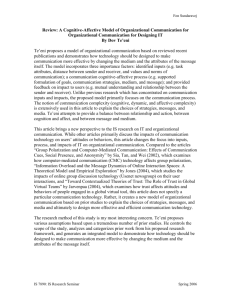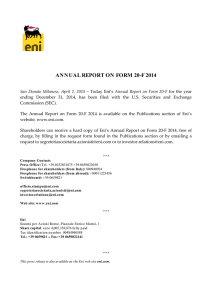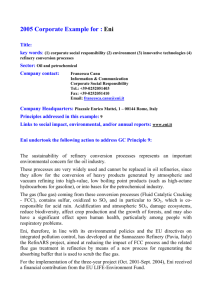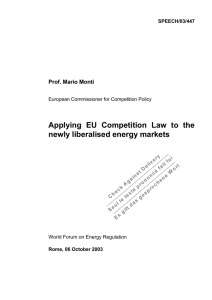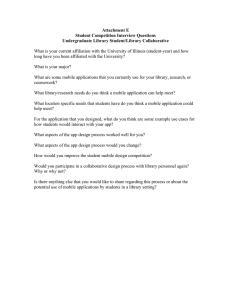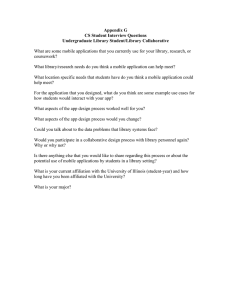Geologia Petrolífera, Aquecimento Global e Campanha de Eficiencia Energética
advertisement
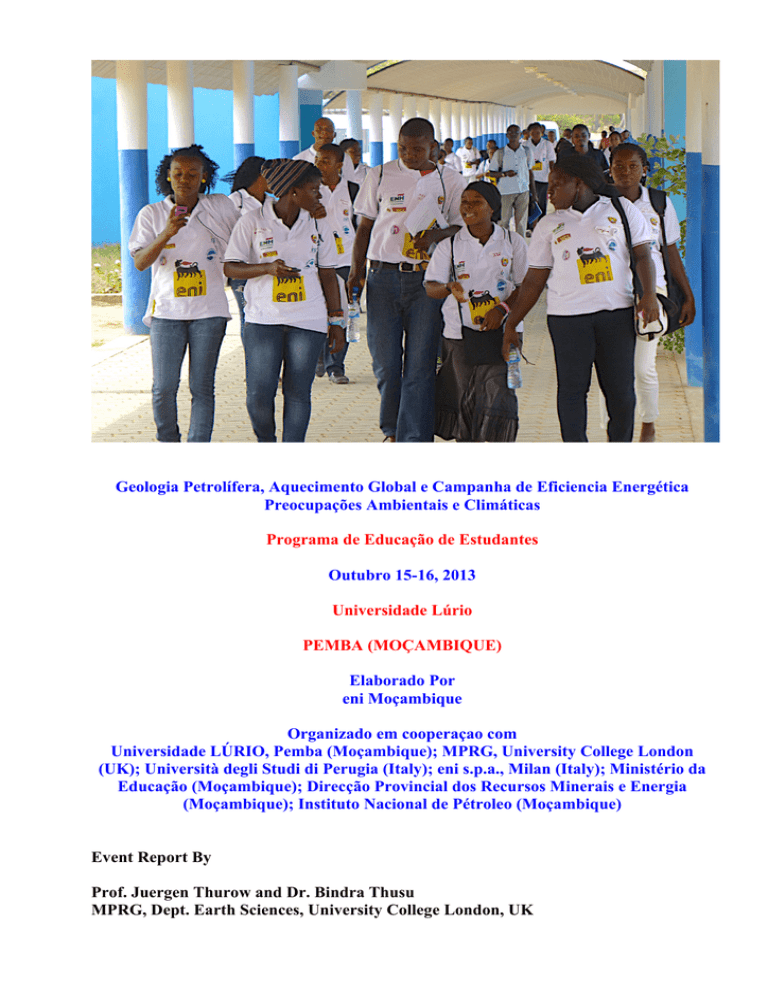
Geologia Petrolífera, Aquecimento Global e Campanha de Eficiencia Energética Preocupações Ambientais e Climáticas Programa de Educação de Estudantes Outubro 15-16, 2013 Universidade Lúrio PEMBA (MOÇAMBIQUE) Elaborado Por eni Moçambique Organizado em cooperaçao com Universidade LÚRIO, Pemba (Moçambique); MPRG, University College London (UK); Università degli Studi di Perugia (Italy); eni s.p.a., Milan (Italy); Ministério da Educação (Moçambique); Direcção Provincial dos Recursos Minerais e Energia (Moçambique); Instituto Nacional de Pétroleo (Moçambique) Event Report By Prof. Juergen Thurow and Dr. Bindra Thusu MPRG, Dept. Earth Sciences, University College London, UK Participants Juergen Thurow, Bindra Thurow – MPRG, Dept. Earth Sciences, UCL, London Giorgio Minelli – Dept. Earth Sciences, Univ. Perugia, Italy Jonathan Craig, Paola Guessarian – eni, Milan, Italy Pablo Flores, Cecilia Huet, Iacopo Del Campana, Celia Tembe, Eurico de Azevedo, Enrique Manhique - eni Mozambique, Maputo, Mozambique José Guina, Seana Daud, Harith Farooq, Ilda Reiser - Univ. Lurio, Pemba, Mozambique 50 secondary school students from the Pemba area, 50 secondary schools students from all districts of Cabo Delgado province and more than 10 of their teachers. In addition we welcomed a number of science students from Lurio University to join the lectures For the first time the eni student event was presented bilingual – Portuguese and English – courtesy to the help of a large number of eni staff and staff from Lurio University who translated the large number of documents we use and helped with translations of the lectures, question and answer sessions and explanation of the geological objects during the event in Pemba. 2 Cover of the “Pemba”-Booklet (in Portuguese) introducing the Event-themes and providing geological background information 3 Acknowledgements 4 Map of Mozambique showing the location of the capital Maputo in the south and the student event location of Pemba in the north. (from http://www.imagineafrica.co.uk/Mozambique/Mozambique_Map) The first “Energy Efficiency Campaign – an eni Student Education Programme (EEC)” - in Mozambique was held at Lurio University, Pemba Campus in Pemba, Cabo Delgado Province, Northern Mozambique on October 15-16th, 2013 preceded by a preparation trip to Mapotu (capital of Mozambique) and Pemba. The delegation to Maputo/Pemba included Sandro Furlan (eni Corporate University), Juergen Thurow, Bindra Thusu (UCL-MPRG), Paola Guessarian, Jonathan Craig (eni-Milan) and met representatives of the Ministry of Education (deputy minister Prof. Arlindo Chilundo, José Filimone), National Petroleum Institute (chairman Arsénio Mabote, José Cidade), eni Mozambique (Chiara Cerruti, Pablo Flores, Yumna Bhikha, Davide Mazzuchelli), and Provincial Directorate of Mineral and Energy Resources in Pemba (director Ramiro Nguiraze, Manuela Magos). 5 In Pemba we were welcomed by our host – Dr. José Guina (above, 6th from the right) the director of the Engineering and Natural Sciences faculty, which forms the Pemba campus of Lurio University, and representatives of the university and the provincial education authorities (Ms. Graziela Temba (above, 8th from the right). Campus building The event banner 6 Buildings on the Pemba Campus of Lurio University 7 Pemba (around 200.000 Inhabitants) is the provincial capital of the northernmost province (Cabo Delgado) of Mozambique. The area recently gained economic importance with the discovery of large gas reservoirs offshore. Universidade Lurio with its main campus in Nampula is a new university providing higher education for the northern provinces of Mozambique. Engineering and Natural Sciences are concentrated at the campus in Pemba. “Our” year 10 students in front of campus building Mission of the Energy Efficiency Campaign Eni is a major integrated energy company, committed to growth in the activities of finding, producing, transporting, transforming and marketing oil and gas. eni men and women have a passion for challenges, continuous improvement, excellence and particularly value people, the environment and integrity. The eni Student Education Programme, conducted in collaboration with University College London, is a key element in eni’s commitment to long-term business sustainability in the countries in which we operate and is part of our global cooperation for sustainable development. The programme is designed to educate and inspire a new generation of scientists who will need to meet the challenge of supplying the world’s growing energy demands in a sustainable way. Geologia Petrolífera, Aquecimento Global e Campanha de Eficiência Energética: Preocupações Ambientais e Climáticas - Programa da eni de Educação de Estudantes 8 Eni è uma grande companhia de energia integrada, comprometida com o crescimento das actividades de pesquisa, produção, transporte e venda de petróleo e gás. A equipa da eni (homens e mulheres), tem uma paixão por desafios, melhoria contínua, ambiente, excelência, integridade e particularmente a valorização das pessoas. O programa da eni de educação de estudantes promovido em colaboração com a University College London, é um elemento chave no nosso compromisso de sustentabilidade a longo prazo dos investimentos nos países em que operamos e representa um contributo da nossa cooperação global para o desenvolvimento sustentável. O programa está desenhado para educar e inspirar uma nova geração de cientistas, que certamente precisarão enfrentar os desafios na crescente demanda do fornecimento, de formas sustentáveis de energia a nível mundial. UCL sendo uma universidade global, com sua visão clara sobre os grandes desafios com que a humanidade e a civilização confrontam-se, tem de ser vista na liderança da intervenção sobre esses desafios. As preocupações não podem ser colocadas com a entrada da universidade, mas muito mais cedo. O programa da eni de educação de estudantes é dirigido principalmente a faixa etária dos 14 – 16 anos, os futuros poluidores ou ambientalistas – è uma oportunidade ideal para partilhar as visões da eni, UCL e a UniLúrio aos jovens estudantes que gradualmente tornam-se conscientes dos problemas que a Terra e os seus habitantes atualmnte enfrentam assim como num futuro proximo. A UCL sente-se previlegiada por fazer parte desse grandioso e bem sucedido programa global. The event was jointly organised by the EEC team from eni Milan, UCL MPRG, Univ. Perugia and eni Mozambique. Univ. Lurio provided the premises and support. We used the main auditorium complex of the university which allowed us to present the lectures, do the poster painting just outside the building, lay out teaching material (rocks, fossils, thin sections, microscopes) in a spacious room just opposite, display the posters and have lunch and tea breaks nearby. 99 students from a 28 public and community secondary schools from Pemba and 16 districts in Cabo Delgado province (+ 10 teachers) attended thanks to the provincial education authority. This represented an excellent coverage overall given the remote locations and the very rudimentary transport system. The students/teachers registered, were given a bag containing a booklet in Portuguese, a CD containing all lecture presentations and some additional background information, exercise sheets, stationary including material for poster preparation, and a polo shirt with the logos of all participating institutions. 9 Registration Students wearing the eni poloshirt The students had arrived the day before allowing us to begin in time with the programme. The programme started with Pablo Flores presenting eni and eni Mozambique’s activities to the audience. 10 Juergen Thurow welcomed all participants and gave a brief programme overview for the next two days, followed by Dr. Guina – director of the Natural Sciences/ Engineering Faculty – who gave the welcome address for the university, followed by welcome addresses by Ms. Graziela Temba from the provincial education authorities and Mr. Ramiro Nguiraze (director of the Provincial Directorate of Mineral and Energy Resources in Pemba. After the introductions all participant moved to the open spaces outside the auditorium for the poster painting competition. Students were asked to produce a poster loosely based around the theme “Global Warming and Climate Change; Energy Conservation and Efficiency; Earth, Energy and Environment”. They could choose between water colours, crayons or colour pencils. The completed posters were hung on a washing line for drying and judging. We invited the local media for a question and answer session. They received a press release and senior eni staff engaged with them. 11 The poster competition 12 Welcome addresses (clockwise from upper left): Pablo Flores, Graziela Temba, José Guina, Ramiro Nguiraze, Paola Guessarian and Juergen Thurow) Poster making and drying 13 The afternoon programme started with an overview of the geological history of Mozambique given by Pablo Flores and Enrique Manhique followed by a vintage movie on early onshore hydrocarbon exploration in the wider Pemba area. The movie proved to be a great hit with the students not so much for the “hydrocarbon” content but for the “wobbly” movements of the exploration geologists. The programme continued with a set of lectures around the theme of “Petroleum Geology” given by Jonathan Craig with contributions by EEC team members. The presentations were given in small “blocks” followed directly by translation into Portuguese 14 Jonathan Craig demonstrating porosity and permeability… …not everybody seems to be convinced 15 Lecture breaks were used for question and answer sessions with students (requiring direct translation) 16 In the evening the students organised an ad-hoc cultural programme including poetry, plays, dancing and singing based around traditional themes. On the second day we started with a presentation by Jonathan Craig and members of the EEC team on Climatic Change, Global Warming and Environmental Concerns followed by a Mozambique-specific discussion of the subject followed by the first exercise. In order to get the students even more engaged they were given an exercise on dinosaur footprints and what possible explanation they can draw from the provided figure. 17 Exercise 1 Footprint Puzzle. Study and observe the Dinosaur footprints at three different positions and answer the following questions: a. How many animals do you think this picture shows? What is your evidence for that? b. In which direction are the animals moving? How do you know? c. Are these animals of the same size? Why or why not? d. What do you think had happened at position 2? What is your evidence for that? OBJECTIVE: Use of evidence and logical reasoning to support an explanation 18 The students presented unique, funny but also more or less realistic explanations for the riddle and a lively and cheerful debate emerged. Lunch - the all time favourite 19 The early afternoon was given over to the object based learning exercise. Specimen of minerals, rocks and fossils supplemented by material from the collection of the Directorate for Minerals and Energy in Pemba and petrographic microscopes/ binoculars were on display in a large hall. In addition posters on geological time, geological history, evolution of life and petroleum geology were on display. The students were divided in groups and began practical exercises at several stations manned by members of the EEC team and Portuguese-speaking geologists from eni Mozambique. The students were guided to differentiate various types of minerals on the basis of physical properties like colour, lustre, streak, fracture and specific gravity. Several igneous, metamorphic and sedimentary rocks including material from the northern provinces of Mozambique were introduced to the students and linked to the different processes behind the formation of these rocks. A comprehensive selection of fossils was displayed and their history and importance in the geological record was demonstrated. Students studying rock, mineral, fossil specimen and petroleum posters 20 It was obvious that the students had no geological background but with the help of the posters many of them quickly grasped the essentials. Practical exercises included demonstrations of “how a hydrocarbon trap” forms using a sandbox alternatingly filled with sugar and ground coffee. Students seemed to be fascinated by this “process-driven” geological simulation and again with the help of the posters on display many easily understood that knowledge of the mechanisms behind trap formation is vital to find hydrocarbons. 21 The afternoon of the second day began with a lecture by Jonathan Craig and members of the EEC team on Energy Efficiency followed by a survey on climate awareness amongst the students. Questionnaire for the Students on Climate Awareness (see appendix for Portuguese version) and answers by students from Cabo Delgado Province (n=99). Because of the total number of students the answers can be taken as percentage values. Concern Confidence ‘Climate Change and how we respond to it are among the biggest issues I worry about today’ ‘The people and organisations who should be doing something about climate change are doing what is needed’ Yes/No 84/15 62/37 Commitment ‘I am personally making a significant effort to help reduce climate change through how I live my life today’ 84/15 Optimum ‘I believe we will stop climate change’ 67/32 The answers indicate a much more optimistic attitude towards the future than e.g. in the western world. 22 The survey was followed by a short interactive sessions with the students, moderated by Bindra Thusu and followed by a revision and discussion session while the results of the survey were evaluated and the awards ceremony was prepared. The most important outcome was that a large number of students want to become geoscientists – hence we achieved something. Who wants to become a geoscientist? Award Ceremony Prizes were awarded for the best posters drawn by the students as judged by anonymous vote by the EEC team and eni staff. Although the posters presented by the students were all good (but not of the high standard of some previous events), three posters were selected for first, second and third prizes and seven posters for consolation prizes. All the students and teachers who participated in the programme were given the certificate of participation. The prize winners are listed in App. X. The prizes awarded were: 6th to 10th prize the book ‘Geology for Dummies’, 4th and 5th prize the book ‘Earth’ (by Marshak), 2nd and 3rd prize the book ‘Earth’ (by Marshak) and a Samsung smartphone and 1st prize the book ‘Earth’ (by Marshak) and an iPhone. 23 Pablo Flores awards the first prize to Xavier Samuel Nuñes (Escola Secundaria – Pemba) The winning poster 24 The jury felt that the winner’s poster complied best with the requirements given, was straight to the point and conveyed a clear message. After closing remarks given in Portuguese by several of the previous speakers and a thank you by Juergen Thurow on behalf of the EEC team the eni Student Event in Pemba officially ended. Cecilia Huet and Paola Guessarian award a certificate of participation to students. Pablo Flores awards the certificate of participation to a teacher. Paola Guessarian presents the two book prizes. Ilda Reiser presents a consolation prize. Olivia Guedes, Aniceto Lupangire and Yassine Jasse are awarded the 4th prize by a representative of the provincial education authority, the 3rd prize by Ramiro Nguiraze and the 2nd prize by José Guina respectively. Xavier Samuel Nunes - the overall winner of the poster competition receives his book prize and iPhone from Pablo Flores. 25 Group photograph and farewell. In summary and taking into account some of the obstacles we faced – the bilingual presentations to mention just one - the Pemba event was highly successful leaving behind a large group of students with an aspiration to work in the geo-energy sector. Impressions of Pemba 26 Appendices App. 1 Example of the certificate awarded App. 2 Feasibility Study – Programme App. 3 Tentative programme (in English) App. 4 Actual programme (in Portuguese) App. 5 Exercises (in English) App. 6 Exercises (in Portuguese) App. 7 List of participating schools App. 8 Attendance List (incl. students, teachers and Univ. Lurio students) App. 9 Winners of the poster competition 27 App. 1 Example of the certificate awarded 28 App. 2 Eni’ Student Education Programme for Energy Efficiency Feasibility Trip Program Team Members: J.Craig (eni e&p), P.Guessarian (eni e&p), S.Furlan (ECU), J.Thurow (UCL) and Bindra Thusu (UCL) Sunday 16th June : -­‐ S. Furlan, P. Guessarian departure from Italy Monday 17th June : -­‐ P.Guessarian, S. Furlan arrival in Maputo (14:44) -­‐ Briefing with EEA -­‐ J. Craig, J. Thurow and Bindra Thusu departure from London -­‐ Overnight in Maputo (P.Guessarian and S.Furlan only) Tuesday 18th June : -­‐ J.Craig , J.Thurow and Bindra Thusu arrival in Maputo (10:05) -­‐ 14h30 : meeting with EEA General Manager and relevant Managers -­‐ Overnight in Maputo (all the team members) Wednesday 19th June : -­‐ 08h00 - Ministry of Education, Ok formal confirmation; the Minister will meet the team at 8h00 [Bhikha Yumna]. -­‐ 10h00 - Petroleum Institute. Ok formal confirmation; the Chairman of the National Petroleum Institute will the meet the team at 10h00 [Bhikha Yumna]. -­‐ Afternoon : possible other meetings with institutions - Ministry of Education, Petroleum, National oil company (?) if needed -­‐ Overnight in Maputo (all the team members) Thursday 20th June : -­‐ Morning : flight to Pemba -­‐ Afternoon : meetings with Lurio University (confirmed through S.Furlan-ECU) -­‐ Overnight in Pemba (all the team members) Friday 21st June: -­‐ Morning : meetings with Lurio University (confirmed through S.Furlan-ECU) -­‐ All team members fly back to Milan and London via Johannesburg – 13:00 Eni charter flight 29 App. 3 Tentative programme (in English) Tentative programme Day 1: 15th October, 2013 8:00 – 8:30 Registration 8:30 – 9:30 Inauguration of the event Welcome by Pablo Flores (eni-Mozambique) Introduction by Juergen Thurow (UCL) Address by a Representative from LURIO Univ., Pemba – José Guina Address by Partners, INP, Ministry of Education, Provincial Directorate of Mineral&Energy Resources Vote of Thanks by Paola Guessarian (eni-Milan) 9:30 -13:00 Poster painting by the students on the themes provided (Global Warming and Climate Change; Energy Conservation and Efficiency; Earth, Energy and Environment) 13:00 - 14:00 Lunch/ Evaluation of posters (the programme team), meeting the Media 14:00 - 15:00 Lecture 1, part a: Petroleum Geology + Discussion 15:00 - 15:25 Break/ Interaction with students 15:25 - Lecture 1, part b: Petroleum Geology + Discussion 17:30 – “Cultural show” prepared by the students Day 2: 16th October 2013 08:30 – 9:30 Lecture 2a: Climatic Change, Global Warming and Environmental Concerns with emphasis on Northern Mozambique + Discussion 09:30 – 10:00 Exercise on Dinosaur footprints 10:00 - 11:00 Lecture 2b: (possibly) Brief outline of the geology of Mozambique+ Discussion 11:00 - 11:20 Break/ Interaction with students 30 11:20 - 13:15 Exercise sessions The participating students will be divided into three groups; Group 1 will study the posters a. petroleum geology, b. time scale, c. evolution of life etc. Group 2 will be given exercises on the identification of different minerals using their physical properties and rock samples, fossil samples, oil samples, etc. which will be kept on display Group 3 will study the rock thin sections to see and understand what the rocks look like as seen at the microscopic level (team members) 13:15 - 14:00 Lunch/ Evaluation of posters (team members) and compilation of the final results 14:00 - 14:30 Lecture 3: Energy Efficiency 14:30 - 15:00 Climate awareness survey for all participating students in one group (the EEC team) and results of the survey announced 15:00- 15:30 Interactive sessions with the students, moderated; (arrangements for the prize distribution ceremony) 15:30- 16:00 Break/ (arrangements for the prize distribution ceremony) 16:00 - Certificates and Prize Ceremony, Group Photograph. 31 App. 4 Actual programme (in Portuguese) 32 33 App. 5 Exercises (in English) Petroleum Geology, Global Warming and Energy Efficiency Campaign: Climate and Environmental Concerns A Student Education Programme October 15-16, 2013 Universidade Lúrio PEMBA (MOÇAMBIQUE) Sponsored by eni Mozambique Organised in co-operation with Universidade LÚRIO, Pemba (Moçambique); MPRG, University College London (UK); Università degli Studi di Perugia (Italy); eni s.p.a., Milan (Italy); Ministério da Educação (Moçambique); Direcção Provincial dos Recursos Minerais e Energia (Moçambique); Instituto Nacional de Pétroleo (Moçambique) EXERCISES EARTH SCIENCE OBSERVATIONS AND INVESTIGATIONS (1) Footprint Puzzle. Study and observe the Dinosaur footprints at three different positions and answer the following questions: a. How many animals do you think this picture shows? What is your evidence for that? b. In which direction are the animals moving? How do you know? c. Are these animals of the same size? Why or why not? d. What do you think had happened at position 2? What is your evidence for that? OBJECTIVE: Use of evidence and logical reasoning to support an explanation 34 (2) Mineral observations. Observe the Minerals and try to differentiate them on the basis of their physical properties using Colour, Lustre, Hardness, Specific gravity and Streak (colour of the powder of the mineral) OBJECTIVE: To understand how geoscientists identify minerals by using their properties (3) Observation and study of the given a.) Rock samples: Igneous, Sedimentary and Metamorphic, b.) Ore mineral samples, c.) Crude oil samples, d.) Fossil Samples OBJECTIVE: To understand the formation and mode of occurrence of different geomaterials, and learn how to differentiate them -----------------------------------TEAR HERE. MARK AND RETURN ------------------------HSBC 2007 Climate Awareness Survey CONCERN CONFIDENCE COMMITMENT OPTIMUM ‘Climate Change and ‘The people and ‘I am personally making a ‘I believe we how we respond to it organisations who should significant effort to help will stop are amongst the be doing something about reduce climate change climate biggest issues I worry climate change are doing through how I live my life’ change’ about today’ what is needed’ YES/NO YES/NO YES/NO YES/NO Appendix 3 35 App. 6 Exercises (in Portuguese) Geologia Petrolífera, Aquecimento Global e Campanha de Eficiência Energética Preocupações Ambientais e Climáticas Programa de Educação de Estudantes Outubro 15-16, 2013 Universidade Lúrio PEMBA (MOÇAMBIQUE) Promovido pela eni Moçambique Organizado em cooperação com: Universidade LÚRIO, Pemba (Moçambique); MPRG, University College London (UK); Università degli Studi di Perugia (Italy); eni spa, Milan (Italy); Ministério da Educação (Moçambique); Direcção Provincial dos Recursos Minerais e Energia (Moçambique); Instituto Nacional de Pétroleo (Moçambique) EXERCÍCIOS OBSERVAÇÃO E INVESTIGAÇÃO DA CIÊNCIA DA TERRA (1) Quebra - Cabeça Estude e Observe as pegadas de Dinassauro nas três diferentes posições e responda as seguintes questões: a. Quantos animais achas que a figura mostra? Qual é ou quais são as suas evidências para tal? b. Em que direcção os animais se movem?? Como e porquê? c. Os animais tem ou não o mesmo tamanho? Porquê? d. O que achas que poderá ter acontecido na posição 2? Qual é ou quais são as suas evidências para tal? OBJECTIVO: Uso de evidências e raciocínio lógicos para suportar um argumento. 36 (2) Observação de Minerais Observe os Minerais e tente diferencia-los, baseando-se nas suas propriedades físicas, usando a cor, brilho, dureza, gravidade específica e Risca (a cor do pó dos minerais). OBJECTIVO : Entender como os geocientistas identificam os minerais utilizando as suas propriedades. (3) Observação e estudo de: a.) Amostras de Rochas: Ígneas, Sedimentares e Metamórficas;, b.) Amostras de minerais individuais;, c.) Amostras de Petróleo bruto;, d.) Amostras de fósseis; OBJECTIVO: Entender a formação e o modo de ocorrência dos diferentes geomateriais assim como aprender a diferencia-los. -----------------------------------MARQUE E DEVOLVA - NOS -------------------------------HSBC 207 Pesquisa Sobre a Consciencialização Climática PREOCUPAÇÃO CONFIANÇA EMPENHO OTIMISMO ‘As alterações ‘Sera que as pessoas e ‘Pessoalmente estou ‘Acredito que nós climáticas e a forma organizações , que tem a fazendo um esforço podemos parar como responsabilidade de fazer significativo para ajudar com as alteraçoes abordamos as algo em relaçao as na reduçao das alteraçoes Climáticas’ mesmas estão entre alteraçoes climáticas, estao climáticas através da os maiores fazendo o necessário’ forma como vivo problemas com que atualmente’ me preocupo atualmente’ SIM/NÃO SIM/NÃO SIM/NÃO SIM/NÃO 37 App. 7 List of participating schools Republic of Mozambique Government of Cabo Delgado Province Provincial Direction of Education and Culture = Pemba = Subject: List of Students per School selected for “eni-students” - Pemba Número de Distritos Nome de escolas Obs. alunos Secondary School of Pemba City 25 Pemba City Secondary School 16 de Junho 15 Secondary School Fraternidade 10 Secondary School of Montepuez 2 Montepuez Secondary School 15 de Outubro 2 Secondary School of Chiure 2 Chiure Secondary School Ocua 1 Secondary School Kuphe 1 Secondary School of Mueda 2 Mueda Secondary School of Mbavala 2 Moc. da Praia Secondary School Januário Pedro 3 Namuno Community Secondary School of Namuno 2 Secondary School of Ancuabe 2 Ancuabe Secondary School of Mariri 2 Community Secondary School of Metoro 2 Balama Secondary School of Balama 2 Secondary School of Muaguide 2 Meluco Secondary School 16 de Novembro 2 Muidumbe Secondary School of Luanda 2 Secondary School of Viaka Sabini 2 Macomia Community Secondary School of Macomia 2 Nangade Secondary School Chama Unidade 2 Secondary School of Nangade 2 38 Mecufi Metuge Palma Quissanga Ibo Secondary School of Mecufi Secondary School of Metuge Secondary School of Palma Secondary School of Quissanga Secondary School of Ibo 2 2 3 2 2 N.B. They are all students of year 10, from Public and Community schools. From Districts: 50 students and 10 members of staff. 39 App. 8 Attendance List 40 41 42 43 44 45 46 47 48 49 App. 9 Winners of the poster competition 50
